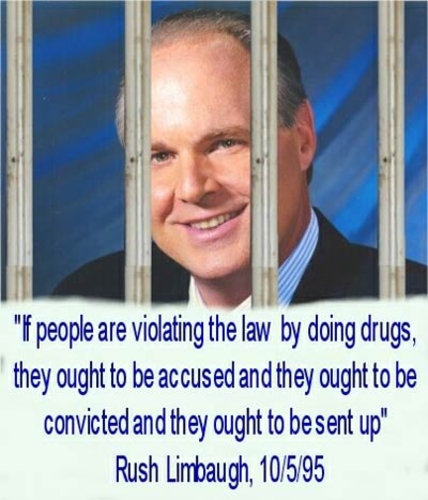
Unchallenged Demagoguery
This kind of sloppiness, ignorance and/or fabrication is run of the mill in Limbaugh's commentary, both broadcast and print. From dioxin to Whitewater, from Rodney King to Reaganomics, Rush Limbaugh has a finely honed ability to twist and distort reality.
Limbaugh's facts are almost never challenged on his programs. A hostile caller hardly ever gets through the screeners on his radio show, and his TV show is just him doing a monologue in front of his cheering audience. No one in the history of national television has had such a political platform. He has almost never corrected anything he's said--although he did apologize once to the aerosol industry for implying that spray cans still had CFCs in them. (CFCs were removed in 1978.)
Limbaugh's chronic inaccuracy, and his lack of accountability, wouldn't be such a problem if Limbaugh were just a cranky entertainer, like Howard Stern. But Limbaugh is taken seriously by "serious" media--in addition to Nightline, he's been an "expert" on such chat shows as Charlie Rose and Meet the Press. The New York Times (10/15/92) and Newsweek (1/24/94) have published his writings. A U.S. News & World Report piece (8/16/93) by Steven Roberts declared, "The information Mr. Limbaugh provides is generally accurate."
He's also taken seriously as a political figure. A National Review cover story (9/6/93) declared him the "Leader of the Opposition." Supreme Court Justice Clarence Thomas, who recently officiated at Limbaugh's wedding, says he tapes Limbaugh's radio show and listens to it as he works out (USA Today, 5/13/94).
FAIR is publishing a compilation of some of Limbaugh's more obvious whoppers in order to convince journalists and political leaders alike that when Limbaugh says, "I'm not making this up, folks," it's time to duck and cover.
Journalists, in particular, have an obligation to challenge Limbaugh's brand of hysteria. Someone who has amassed a powerful political following through the regular use of half-truth and distortion is begging for tough media scrutiny. In 1954, Edward R. Murrow confronted another demagogue who had a similar allergy to facts and documentation. Today's TV networks don't ask themselves how they can challenge Limbaugh's reign of error--but how they can profit from him. CBS News, the platform from which Murrow denounced Joe McCarthy, has been seeking to hire Limbaugh as a political commentator.
Real democracy is built on debate. But Limbaugh has little use for debates; he has forged a media empire largely on unchallenged monologues. The following confrontation--Limbaugh vs. Reality--is an attempt at stimulating (or at least simulating) a debate.
The list of fallacies compiled here is not exhaustive. It was assembled from easily available sources--Limbaugh's books, The Way Things Ought to Be and See, I Told You So; transcripts of several weeks' worth of his TV show; gleanings from as much of his radio show as we could take; and other published evaluations of Limbaugh's accuracy. (There's a publication, the Flush Rush Quarterly (FRQ), largely devoted to chronicling Limbaugh's falsehoods, and a book, The Bum's Rush, by Don Trent Jacobs, that debunks his environmental rhetoric.) As Josh Shenk showed in the New Republic ("Limbaugh's Lies", 5/23/94), scrutinizing the TV show for a month results in errors too numerous to count.
"There's a pathology here, folks," is a phrase Limbaugh likes to use when discussing President Clinton's alleged inability to tell the truth. A psychiatrist might agree--and label it projection.
http://www.fair.org/index.php?page=1895
 Posted By: Marta Fernandez
Posted By: Marta Fernandez
Saturday, March 7th 2009 at 11:38AM
You can also
click
here to view all posts by this author...